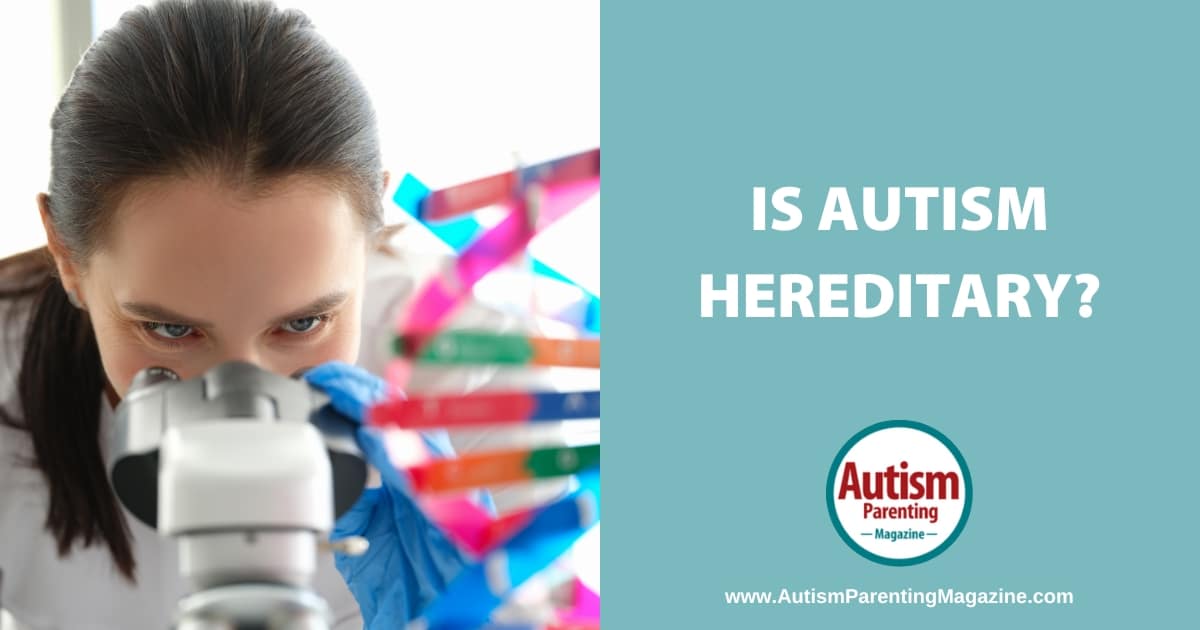
“He can’t have autism; our family has no history!” These words from family members cut me like a knife when my youngest son was diagnosed with autism, and it immediately brought up the age-old question: Is autism hereditary?
My son was just three weeks shy of turning two years old when he was diagnosed, and I know my family didn’t mean anything by the statement. It’s hard to hear your loved one has been diagnosed with autism. But it still hurt, not because of the possibility of autism being hereditary; I had already accepted that possibility, but because there was a history of autism. It was just on my side of the family.
I have a family member diagnosed with Autism Spectrum Disorder (ASD) in the mid-2000s. Back then, the official diagnosis was Asperger’s, but that diagnosis is no longer used. Still, there was already a connection on my side of the family before either of my children was diagnosed. And that doesn’t even include any diagnoses that have been missed over the years due to a lack of knowledge or understanding at the time.
My situation aside, many parents wonder if autism is hereditary, and below, we answer some of the most burning questions.
Can You Inherit Autism?
The simple answer is “yes,” autism spectrum disorder can be inherited. However, that doesn’t mean everyone with autism spectrum disorder inherited it.
There’s no definitive cause for autism spectrum disorders. Still, research from around the globe has found developmental, genetic, and environmental factors are connected to autism spectrum disorders.
Dr. Daniel Geschwind is a professor of human genetics, neurology, and psychiatry at UCLA. During a recent interview, he cited a study published in Jama that identified 80% of autism spectrum disorder cases are likely caused by genetic factors passed through DNA.
To return to the main question of “Is autism hereditary,” that means while not all autism spectrum disorders are inherited, a vast majority of them likely are hereditary.
Is There An ‘Autism Gene?’
The simple answer to this question is “no.” There is no definitive gene that identifies autism spectrum disorders. Mount Sinai Hospital posted a study in 2022 that identified more than 70 genes involved with autism spectrum disorder diagnoses.
While it looks at genetic factors and variations that may be connected to autism spectrum disorders, no gene clearly defines ASD. Thus, while there may not be a single gene for autism spectrum disorder diagnoses, genes are still involved in each diagnosis.
How Do Genes Contribute To Autism Spectrum Disorders?
Several studies have used the prevalence of ASD in boys to suggest genetic influence from the X chromosome may influence autism spectrum disorders. However, these studies failed to find a consistent link, reinforcing the belief that autism spectrum disorder is complex.
The prevalence of the chromosome has also been linked to several co-occurring genetic conditions, including Fragile X syndrome, Down Syndrome, Pradel-Willi Syndrome, Angelman Syndrome, Rett Syndrome, Epilepsy, and Schizophrenia. The possibility of these connections has contributed to a stronger push for genetic testing.
Many studies have also examined how possible mutations affect the genes identifying autism spectrum disorders. These studies have found strong connections with the sample group for these candidate genes. Still, unfortunately, none of them were conclusive due to the complexity of autism spectrum disorder.
Click
here to find out more
Can You Test For Autism Before A Child Is Born?
Suppose someone in your family has been diagnosed with an autism spectrum disorder. Is it possible in some countries to test for autism before the child is born?
According to the National Library of Medicine, prenatal genetic testing is available in places like the United States. These tests can prepare a parent for their child’s potential to be affected by autism spectrum disorders and allow them to prepare early intervention strategies for their affected children.
However, it should be noted that, as with all other prenatal testing, there is no guarantee. The test may show a child is at an increased risk of autism spectrum disorder only for the child never to be diagnosed. The reverse situation is also true. The test is available, but its results should not be considered gospel.
Conclusion
Is autism inherited? Yes and no.
It can be, and quite frankly, I’m almost sure it is inherited in my children’s cases. We have other confirmed diagnoses among other family members. I even wrote an article for the Autism Parenting Magazine blog addressing undiagnosed autism in adults and my belief that I may be an undiagnosed case.
However, not every autism spectrum disorder diagnosis is hereditary. Still, if there is a family history of autism spectrum disorders and you would like to pursue genetic testing for your child, it’s worth researching. Autism Parenting Magazine has also tackled the issue of genetic testing. You can read up on it and decide for yourself and your family.
The post Is Autism Hereditary? appeared first on Autism Parenting Magazine.
Get a FREE issue of Autism Parenting Magazine at https://www.autismparentingmagazine.com/freegift/
This content was originally published here.
